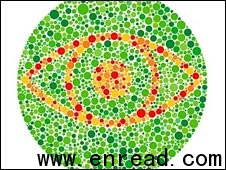'Gene cure' for colour blindness “基因疗法”治色盲
(单词翻译:单击)
Scientists say they are a step closer to curing colour blindness using gene1 therapy.
科学家称,他们利用基因疗法治疗色盲的方法更进了一步。

A person with normal colour vision will be able to see the eye in this image
A US team were able to restore full colour vision to adult monkeys born without the ability to distinguish between the colours red and green.
Nature journal describes the technique used by the researchers at the University of Washington.
Although more studies are needed, the same treatment may work for humans who are colour blind, experts believe.
Full colour
Until now scientists had not thought it was possible to manipulate the adult brain in this way.
It was considered that adding new sensory2(知觉的,感觉的) information, such as the visual receptors necessary for perfect colour vision, could only be done in the earliest years of life when the brain is at its most malleable3(可塑的,易改变的) or "plastic".
But Professor Jay Neitz and his team were able to introduce therapeutic4(治疗的) genes5 into the light-sensing cells at the back of the eye of adult male squirrel(松鼠) monkeys.
The therapeutic genes contained the necessary DNA6 code to enable the light-sensing cells to distinguish between red and green - something lacking in the male monkeys.
Tests revealed the gene therapy was a success. The male monkeys now possessed7 the necessary photopigments(光色素) to see all colours and were able to correctly pick out red from green on computer image tests.
The monkeys were treated over two years ago and their improvement in colour vision has remained stable since.
Professor Neitz's team will continue to monitor the animals to evaluate the long-term treatment effects.
They are hopeful that a similar therapy could benefit people who are colour blind.
"This provides a positive outlook for the potential of gene therapy to cure adult vision disorders," they said.
There are several forms of colour blindness. The most common form is inherited(继承的,遗传的) red/green colour blindness, passed on through a faulty colour vision gene on an X chromosome8.
Sometimes colour blindness occurs because of diseases such as macular(有斑点的,有污点的) degeneration or from side effects of medicines.
Winfried Amoaku, an expert in ophthalmology(眼科) at the University of Nottingham, said the research could eventually benefit approximately 7% of males and 1% of females born with genetic9 colour deficiencies(缺乏,不足).
He said: "These research seems to be the first in primates10(灵长目) to address the colour vision deficiencies and indicate that intact cells are modifiable in their colour perception.
"Further research is required, however, before this comes to human clinical trials, and therapy in the clinics."
 收听单词发音
收听单词发音
1
gene

|
|
| n.遗传因子,基因 | |
参考例句: |
|
|
|
2
sensory

|
|
| adj.知觉的,感觉的,知觉器官的 | |
参考例句: |
|
|
|
3
malleable

|
|
| adj.(金属)可锻的;有延展性的;(性格)可训练的 | |
参考例句: |
|
|
|
4
therapeutic

|
|
| adj.治疗的,起治疗作用的;对身心健康有益的 | |
参考例句: |
|
|
|
5
genes

|
|
| n.基因( gene的名词复数 ) | |
参考例句: |
|
|
|
6
DNA

|
|
| (缩)deoxyribonucleic acid 脱氧核糖核酸 | |
参考例句: |
|
|
|
7
possessed

|
|
| adj.疯狂的;拥有的,占有的 | |
参考例句: |
|
|
|
8
chromosome

|
|
| n.染色体 | |
参考例句: |
|
|
|
9
genetic

|
|
| adj.遗传的,遗传学的 | |
参考例句: |
|
|
|
10
primates

|
|
| primate的复数 | |
参考例句: |
|
|
|
- 上一篇:Doctors warn on climate failure 专家警告环境变化的严重后果
- 下一篇:Brown book breaks record in hours Brown新小说打破销售记录




